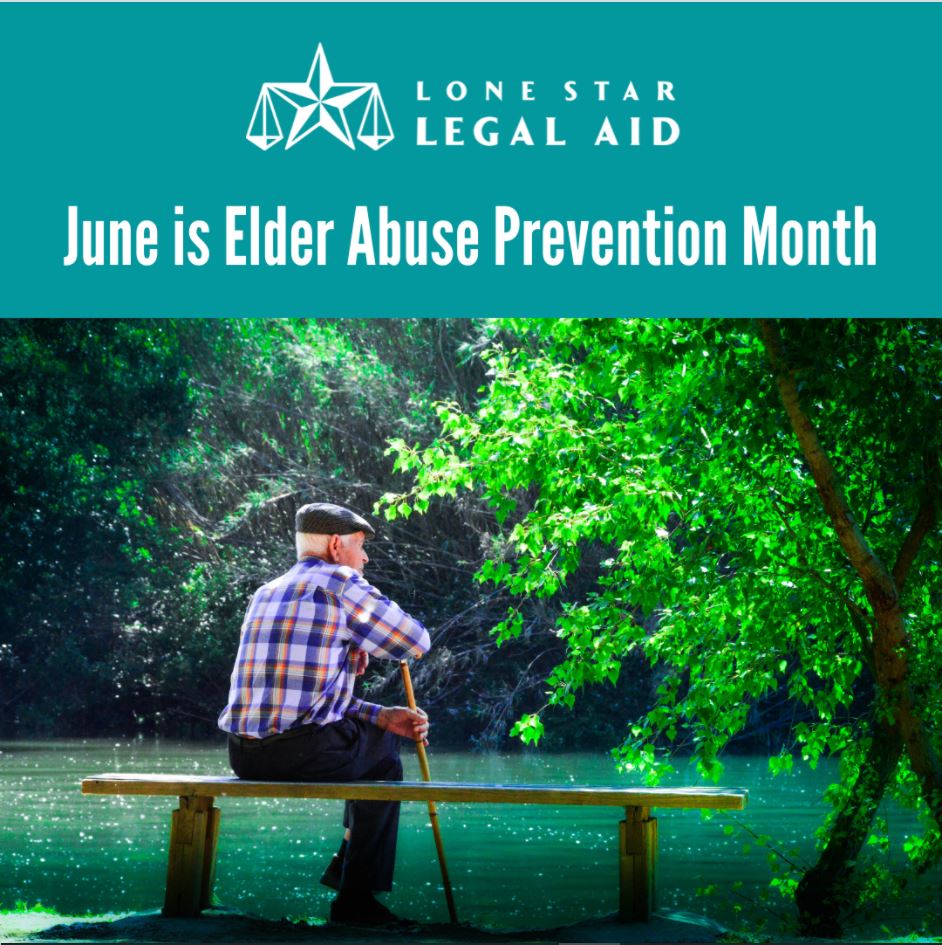June 13, 2021 by Natalie Cochran
Elder Abuse Prevention in TX: Older Adults are Often Unaware of their Legal Rights

June is Elder Abuse Prevention Month and all month, we are working with community partners and professional groups around the state to raise awareness about adult abuse, neglect, and financial exploitation. Our Justice for Older Adults aims at assisting older adults living in 25 high-poverty counties. This new advocacy initiative will serve older adults facing a variety of civil legal issues.
Our elderly population routinely faces several forms of abuse, like neglect and financial exploitation. Consistently educating the public through advocacy and action will provide awareness and prevention of elder abuse.
Elder abuse is defined as intentional and negligent acts by a caregiver that causes harm, distress or serious risk. As people become older and frailer, they are unable to take care of themselves and require trusted caregivers to be responsible for their needs. Victimization can include physical, sexual, emotional abuse, as well as neglect.
While physical abuse, neglect and abandonment are frequently used forms of elder abuse, financial exploitation is the most common and fastest growing form of elder abuse. Anyone can take advantage of the elderly, whether they are a caretaker, a family member, neighbors, attorneys, bank employees, doctors, or nurses. The mistreatment of venerable adults is widespread and can even become deadly. Only one in six elderly people actually report their abuse.
Older adults often do not know that their needs are legal in nature, and they are not fully aware of their legal rights and responsibilities or of the options available to resolve their legal issues. Unscrupulous caretakers and fears of repercussions also may prevent this group from asking for and getting legal help. Too frequently they do not have access to an attorney or meaningful access to the courts. When this group tries to resolve legal problems on their own, they face an overwhelming legal system with regulations, rules, procedures, complex terminology, deadlines, and necessary document filings.
World Elder Abuse Awareness Day is approaching. Yearly on June 15, the world provides opportunities for communities to promote a better understanding of elder abuse and neglect of older people.
It is important to know what forms of abuse are happening, whether the caregiver is a professional or a family member. Prevention and response strategies for vulnerable adult abuse are many throughout Texas. If you witness a suspicious situation of elder abuse, call the Texas Abuse Hotline at 1-800-252-5400 or report online at the TxAbuseHotline.org.
If you or a loved one require an attorney, applications for free legal help can be made at www.LoneStarLegal.org. If you would like to explore other resources for elder abuse survivors, you can visit the Texas Crime Victim Legal Assistance Network. If you would like to explore self-help resources, please visit www.texaslawhelp.org.
Lone Star Legal Aid is a 501(c)(3) nonprofit law firm focused on advocacy on behalf of low-income and underserved populations. Lone Star Legal Aid serves the millions of people at 125% of federal poverty guidelines that reside in 72 counties in the eastern and Gulf Coast regions of Texas, and 4 counties of southwest Arkansas. Lone Star Legal Aid focuses its resources on maintaining, enhancing, and protecting income and economic stability; preserving housing; improving outcomes for children; establishing and sustaining family safety and stability, health and well‐being; and assisting populations with special vulnerabilities, like those who have disabilities, or who are elderly, homeless, or have limited English language skills. To learn more about Lone Star Legal Aid, visit our website at www.lonestarlegal.org.
Media contact: media@lonestarlegal.org
